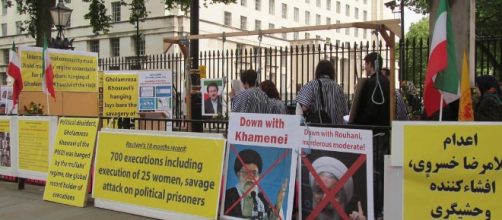In 2009, the Iranian people took to the streets in protest against a faulty election. Chants of "Death to Dictator" and "Down with the religious jurisprudence" rang through cities throughout Iran, as citizens showed their distaste for their current governance. Although the protests were quelled as a result of vicious backlash from the regime itself, it is nonetheless evident that the Iranian people yearn for a free and democratic society. Despite an unstable nuclear agreement that unwarrantedly legitimized an oppressive to pursue their destabilizing activities in the region further, it is clear that the Iranian people have yet to achieve their democratic goals.
With the Supreme Leader's demise only a short ways away, a turning point in Iranian politics and society is beginning to uncover. Now more than ever, it is vital for the United States to stand on the side of democracy, rather than attempting to legitimize a regime that is near collapse.
Drawing red lines against the Islamic Republic
First and foremost, it is vital for the US and its allies to establish a clear red line against the ongoing oppressive activities of the Iranian government. Since the signing of the nuclear deal, Iran has become emboldened to further pursue their destabilizing activities in the region, non-inclusive of the continued Human Rights Abuses domestically.
Just recently, the National Council of Resistance of Iran (NCRI), uncovered that the nuclear deal hadn't caused so much as a hiccup in the regime's pursuit of a nuclear weapon.
Despite the continued activities towards proliferation, world leaders have done little to keep the an apparent in check. This, coupled with the continued support of the Assad government and funding of terrorist groups such as Hezbollah, spells a clear need to confront the Islamic Republic to deter further destabilizing activities in the region.
The United States and Western allies must not only draw red lines for the Iranian government but be willing to enforce them when need be. Reimplemented sanctions and international pressure on the regime can present difficulties for the already unstable government, providing a means of resistance for the internal Iranian population.
Supporting the Iranian resistance
One option that seems to be swept under the rug concerning dealing with Iran is that of empowering the Iranian people and their democratic opposition, the NCRI. For decades, the NCRI has not only garnered the support of dozens of officials worldwide but has been a clear ally of the West in uncovering Iran's clandestine activities. These actions have ranged from revealing the regimes nuclear activities to identifying the means and networks by which the Iranian government continues to support terrorist networks.
The NCRI has provided clear and apparent policy solutions to levy against the brutal regime, including the push for continued sanctions and urging an FTO designation of the regime's paramilitary organization, the IRGC.
Empowering the NCRI in their efforts to unseat an oppressive regime is crucial in establishing democracy and freedom in a society that yearns for such progress. Furthermore, it provides a non-military and non-appeasing policy option to ensure that the future of Iran is a truly progressive one, and not one of continued executions and human rights abuses.
When analyzing the most invasive and destabilizing threats to the Middle East, it is evident that the Islamic Republic's stride towards hegemony is among the most detrimental. With a massive power shift imminent in the country, it is vital that the West halt their activities of appeasement, and empower the Iranian population in their fight for democratic ideals. Drawing enforced red lines, supporting the people's resistance, and emboldening the Iranian people is the only surefire way to ensure an ally in the region going forward.


